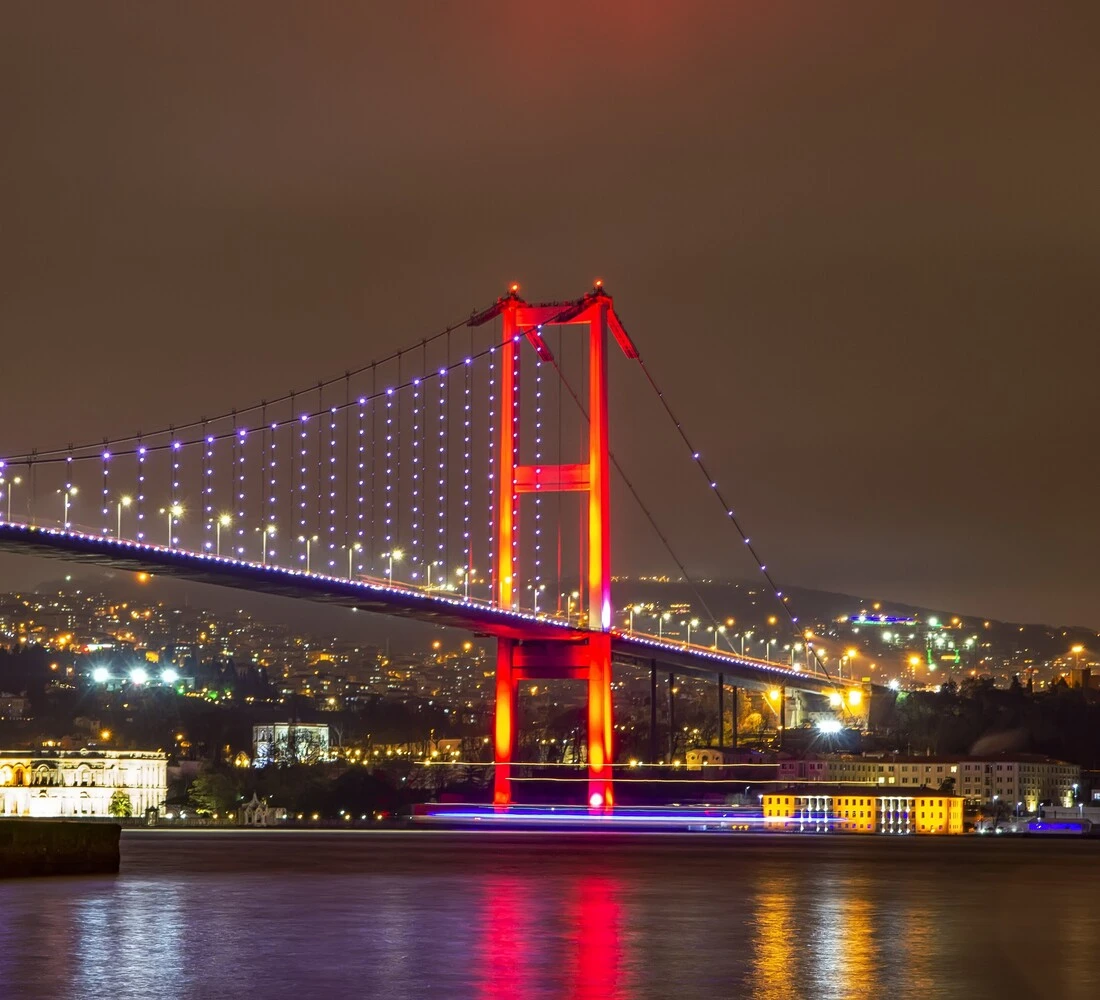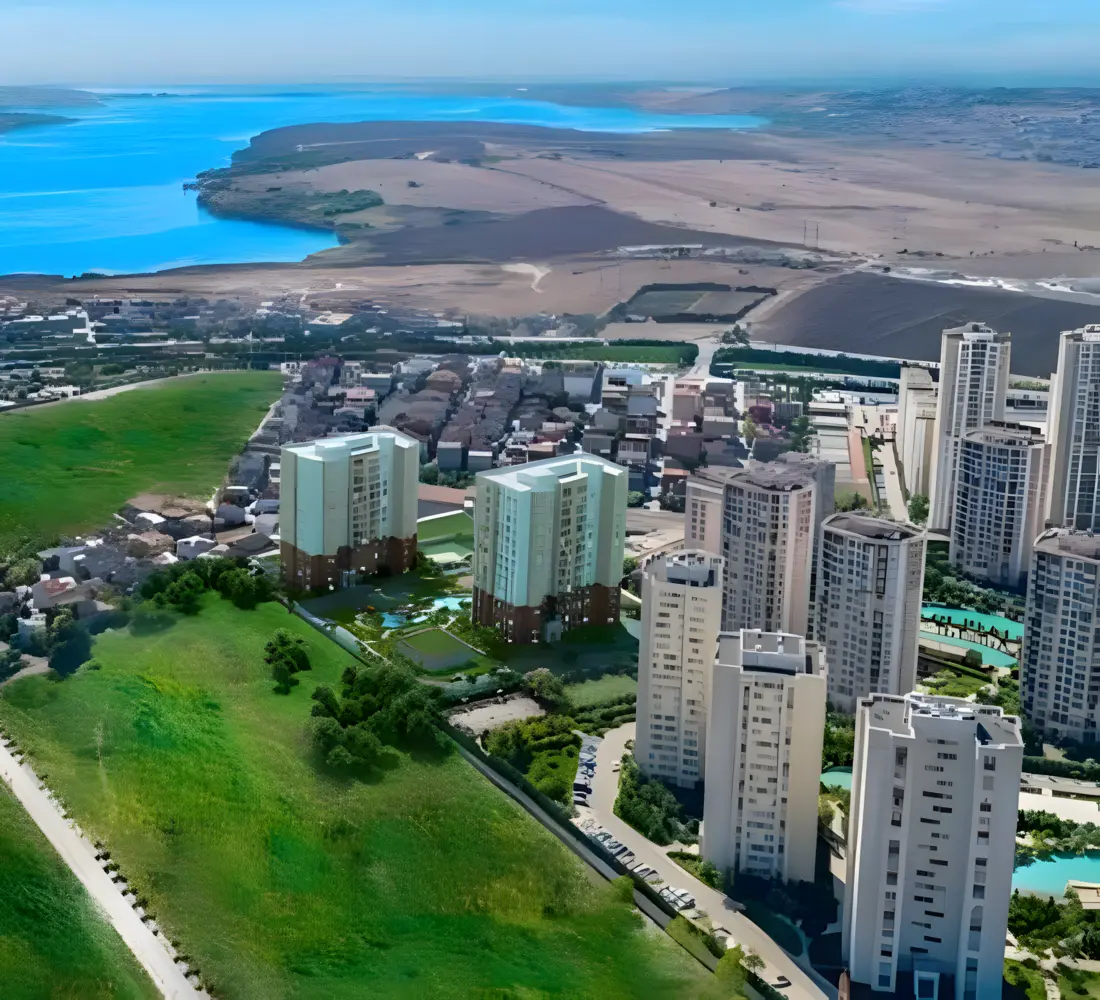Istanbul is the largest city in Turkey and its economic, touristic, and cultural capital. It holds great significance due to its central geographic location, religious and cultural importance, and stunning natural beauty. Situated at the meeting point of Europe and Asia, Istanbul acts as a bridge between the East and West, bringing together diverse civilizations over the ages.
Not only is Istanbul a vast city in terms of area and population, but it is also a thriving economic hub hosting numerous global companies and financial institutions. Additionally, the city is a major tourist destination, attracting millions of visitors annually with its historical landmarks. Istanbul is not just a historical and cultural center, but also a symbol of diversity and coexistence among different cultures.
Location :
Istanbul, the historic city that combines civilizations of the East and West, is located in the Marmara region in northwestern Turkey. Bordered by the Black Sea to the north, the Sea of Marmara to the south, Tekirdağ province to the west, and Sakarya and Kocaeli provinces to the east. The Bosphorus strait divides the city into two parts: the eastern part in Asia (Kocaeli peninsula) and the western part in Europe (Catalca peninsula) within the Thrace region of southeastern Balkans. Istanbul's location is considered one of the best defensive positions in the world, giving it strategic importance throughout history.
The total area of Istanbul province is 5461 square kilometers, with 5343 square kilometers being on land. The central city area covers 1830 square kilometers and is administratively divided into 39 municipalities, with 27 of them comprising the central city.
Climate and Weather :
Istanbul is characterized by a moderate climate ranging from hot and humid summers to cold and rainy winters, with frequent snowfall. In the spring and fall seasons, the weather is mild with scattered rainfall, making the city an ideal tourist destination year-round. Istanbul reflects its rich history and diverse climate, making it one of the prominent global cities.
Istanbul - Cultural Diversity :
Istanbul is one of the largest and most populous cities in Turkey, with its residents accounting for 18.88% of the total population of the country. The city has 7.80 million male residents and 7.84 million female residents. Istanbul also ranks as one of the most densely populated European cities, surpassing 131 countries at the same time, making it a significant urban center that greatly influences the economic and cultural life of the country.
Istanbul stands out for its unique ethnic and religious diversity, reflecting its long history as a cultural and commercial hub over the centuries. While Sunni Muslims make up the majority of the city's population, there are several religious minorities living there contributing to its cultural diversity. Among these minorities, the Alevis are at the forefront of religious groups, constituting the largest religious minority in Istanbul.
In Istanbul, there are diverse Christian communities, including Greek Orthodox Christians, Armenian Orthodox Christians, Eastern Catholic Christians, and Latin Catholics. Additionally, the city is home to a Jewish community composed of Sephardic Jews and some Ashkenazi Jews.
Istanbul's ethnic and religious diversity grants it a prestigious status among global cities, where this human mosaic reflects a long history of coexistence and interaction between different religious and ethnic groups. The cultural diversity in Istanbul not only enriches the city's social and cultural life, but also enhances its position as a symbol of tolerance and peaceful coexistence among various human groups.
Istanbul - A rich history :
The city has been known throughout history by various names, including Byzantium, Constantinople, Astana, and Istanbul. Its history dates back to the Neolithic era, with evidence suggesting it was inhabited in the 7th millennium BC, meaning it was settled before the formation of the Bosphorus Strait.
In the mid-7th century BC, Greek immigrants founded the city of Byzantium in the Sarayburnu area (where the Golden Horn meets the Sea of Marmara) on the European side of Istanbul. In 330 AD, Constantine the Great chose Byzantium as the official capital of the Roman Empire and renamed it Constantinople.
After the Roman Empire split into Eastern and Western empires in 395 AD following the death of Emperor Theodosius I, Constantinople became the capital of the Eastern Empire, while Rome became the capital of the Western Empire.
The city flourished greatly during this period, and its religious, commercial, political, and military stature grew. From a religious perspective, it became a capital for the Orthodox Christians, with its church "Hagia Sophia" considered one of their sacred places. With the rise of Islam and the expansion of Muslims in the world in the 7th century AD, Constantinople became a target for conquest, several armies attempted to capture it during the Umayyad Caliphate but all failed due to its defenses and high status in the hearts of the Byzantines who fought fiercely to defend it. However, these attacks significantly weakened the Byzantine Empire. The Catholic Crusaders - as a result of their historical conflict with the Orthodox Christians - attacked it in 1204 during the Fourth Crusade, where they besieged, looted, and committed massacres in the city.
The Ottomans gradually managed to control the lands of the Byzantine Empire in Anatolia, taking over key cities like Bursa and Izmit, which formed the eastern land gateway to Constantinople, as well as Gallipoli overseeing the Dardanelles Strait. They expanded west of the city to Thrace, capturing Adrianople, and their wars reached Bulgaria and Greece, tightening the noose around the city and isolating it completely from its surroundings.
Constantinople fell on May 29, 1453, into the hands of the Ottomans led by Sultan Mehmed II, known as Mehmed the Conqueror, after a 53-day siege and complex military operations to breach the city's defenses from land and sea. Following the Ottoman conquest, the conqueror relocated the Ottoman state capital from Adrianople to Constantinople, which was renamed Istanbul (meaning "City of Islam"), marking the beginning of a new era in the city's history.
The Ottomans worked to restore Istanbul to its previous cultural, economic, and political stature, leading it to thrive once again as an example of a rich and multicultural society. Istanbul became the capital of the Islamic caliphate in 1517 when Sultan Selim I declared himself the caliph of Muslims after being granted the caliphate by the last Abbasid caliphs in Egypt, reaching the peak of its strength and prosperity, attracting numerous talents in various fields of politics, trade, and different sciences.
Allied forces occupied Istanbul at the end of World War I, remaining until the fall of the Ottoman Empire and the declaration of the Republic of Turkey under the leadership of Mustafa Kemal Atatürk, withdrawing as per the Treaty of Lausanne.
After Atatürk took power, the political capital was moved to Ankara, but Istanbul's significance remained high, especially after the reforms and developments made since the 1950s.
Istanbul - The economic engine of Turkey :
Istanbul is considered the main economic center in Turkey, providing job opportunities for up to 20% of the workforce and contributing to 22% of the GDP. Istanbul is responsible for 40% of the country's total tax revenues and produces 55% of the exports. The city excels in cultivating cotton, fruits, sunflowers, olives, and tobacco, with important industries including food, textiles, oils, rubber, leather goods, chemicals, pharmaceuticals, electronics, glass, and machinery assembly.
Istanbul - The world's top tourist destination :
Tourism is considered one of the main economic activities in Istanbul, as it significantly contributes to the city's income due to the unique infrastructure it provides for tourists.
Istanbul hosts a wide range of events, programs, and festivals in various scientific, artistic, cultural, economic, and political fields, which helps attract attention and increase its income. Statistics indicate that there are approximately 35 billionaires living in Istanbul, ranking the city fourth globally in terms of the number of wealthy individuals residing there.
The city is also characterized by its prominent landmarks that have gained international fame over the ages, with public areas like Taksim Square, Istiklal Street, Eminonu Port, and Yeni Kapı among the most prominent landmarks that distinguish this unique city. Istanbul is also famous for its grand mosques with prominent Ottoman architecture, such as the Suleymaniye Mosque, Sultan Ahmed Mosque, and Fatih Mosque, in addition to Hagia Sophia Mosque, reflecting its diverse and rich history. The city flourishes with its famous museums such as Panorama 1453, Topkapi Museum, and Dolmabahçe Museum, which preserve the history of the Ottoman Empire and reflect its cultural heritage. Furthermore, Istanbul includes stunning gardens like "Gulhane Park," traditional Turkish baths, cinemas, and cafes that reflect the essence of social and cultural life in this magnificent city.






